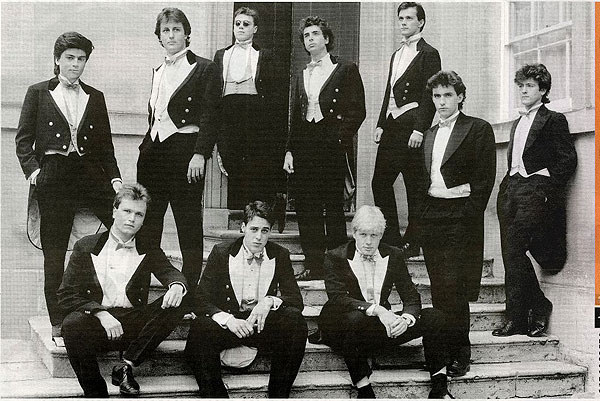October 22, 2010
The Great Bullingdon Club Swindle

We're all in this together
Capitalist realism everywhere ... On television yesterday morning, the relentless message coming from pundits and vox pops - even from most of those who reject the particular form that the cuts have taken - was that "something had to be done". The Great Bullingdon Club Swindle is larceny and deception on such a grand scale that one almost has to admire its breathtaking audacity. The Bullingdon Club has pushed Doublethink to new limits with its mantric repetition of the ludicrous claim that it was New Labour policy, rather than the bank bail-outs, that was responsible for the massive deficit. The strategy seems to be to employ the illocutionary power of repetition - if they keep saying it, then it will have been true. The Bullingdon boys are working a mass hypnosis trick, forcing through shock doctrine measures while the population are still in a kind of post-crash trance. But where, previously, neoliberals had used the crises in other political systems (state socialism, social democracy) as an opportunity to helicopter in their 'reforms', on this occasion they are using a crisis brought about by neoliberal policy itself to try to electro-shock the neoliberal programme back into life. I heard one buffoon on television saying that "we've been in denial for the last ten years". If there's denial, it's happened in the last two years, and on the part of the neoliberals and their friends in the business elite, who - after demanding at gunpoint unprecedented sums of public money - are now brazenly continuing to peddle the story that they are the friend of the taxpayer and that it is welfare claimants, not them, who are the scroungers who have brought the country to the "brink of bankruptcy". In what must surely be the most astonishing bait and switch in British parliamentary history, the victims of neoliberal policy - public services and the poor - are now being asked (or rather forced) to pay for the manifest and total failure of that policy. As John Gray argues in the LRB, it's no surprise that Orange Bookers like the "wolf-eyed replicant" Nick Clegg - as China Mieville memorably described him - are happy to impose on the country the same neoliberal programme that they have imposed on their own party. Even so, has there even been a party that has so comprehensively and so quickly squandered the good will of those who voted for them as have the Lib Dems? Cuddly Vince Cable's grinning excuse for the backtracking on student fees was a masterclass in capitalist realism, as he practically said, "well, that's what happens when you get into power - you give up your principles." (Cable is increasingly looking like a villain from a John Grisham flick, the avuncular eminence grise whose charm lures you into the firm, before being revealed to be a sinister embezzling fraudster.)
For months now, we've been sold the story that public services are 'bloated'. There's no doubt that New Labour mismanaged public services and wasted money - on managers, on market Stalinist control procedures imported in from business, and on GPs' ludicrously overinflated salaries. But the narrative of an overfunded public sector produce cognitive dissonance for those of us who have actually been delivering frontline public services in the last ten years, where we've been expected to do more work for less money and with fewer resources. If those were the good times, you can only feel a shudder of dread anticipating what it will be like when things are bad. Incidentally, if you've wondered why there have been so few posts here in the last month or so, it's because I've been trying to piece together a living as a visiting (i.e. casualised) lecturer, working in institutions that are strained to breaking point by neoliberal 'reforms'. Cuts will mean more casualisation, in those institutions that will be able to survive at all.
But the most breathtaking aspect of the Bullingdon swindle is the "we're all in this together" slogan, rightly described by Seumas Milne as "preposterous". What we're seeing now is the Terminator of Capital with its neoliberal-managerialist mask wrecked, and the Big Society (Victoriana 2.0) ruse not convincing anyone. The doughy, fat-of-the-land face of privilege now shows itself openly, exuding the emollient manner of noblesse oblige, but without any sense of obligation. What survives is pure ideological reflex, the decorticated Terminator blindly blasting at its usual tragets: public services, welfare, the arts. It's folk economic faux-wisdom ("if a household overspends, we know that we have to give up things we'd rather keep") that is providing the smokescreen for this ideological assault. Myths and deliberately cultivated misapprehensions abound: judging from all the rhetoric, you'd think that education and the arts were drains on the economy, rather than the highly successful "businesses" that they in fact function as.
Nevertheless, it's crucial that we recognise that this is a time of opportunity for the left. Laurie Penny is right that the Labour Party does not have the answers at the moment. Yet the Labour Party's current lack of an agenda can be seen as a good thing, for two reasons. Firstly, at least this means that Labour has lost the managerialist neoliberal agenda that defined it for the last fifteen years. The de-New Labourization process will take a while, but it will be expedited much quicker with Ed Miliband as leader than it ever would have been with David at the helm. (Notice how David - whom the media were presenting as a great lost leader, a kind of world-historic statesman, on the grounds, presumably, that Hilary Clinton took a fancy to him - is already a forgotten man. In the media's soap narrative, David's leaving front bench politics was an open wound which the Labour Party would take years to recover - that doesn't quite seem to be the case.) Secondly, the fact that the post-Blair and Brown Labour Party is now a cored-out shell means that it is a space, which it is at least plausible that could be filled by new ideas and strategies. For the first time in fifteen years, the future of the Labour Party is not fixed. It's worth remembering at this point that the failures of the Labour Party, its succumbing to capitalist realism, is not just the consequences of the internal logic of the party. It was extra-Parliamentary forces that gave rise to the Labour Party in the first place; it was the defeat of those forces that drove the Labour Party into its craven placting of business in the New Labour era. If Labour is to be anything more than a zombie party once again, it will be new forms of extra-parliamentary organisation that revivify it.
For that reason, this is definitely not the time to recline into the leftist version of capitalist realism, the defeatist counterpart to the Bullingdon club's bullishness. Now is the time to organise and agitate. The cuts can provide a galvanising focus for an anti-capitalist campaign that can succeed. Protests in these conditions won't have the hubristic impotence of anti-capitalist 'feelgood feelbad' carnivals and kettles. This is shaping up to be a bitter struggle, but there are specific, determinate and winnable goals that can be achieved here: it isn't a question of taking a peashooter to the juggernaut of capital.
The UK, the first capitalist country, is the world capital of apathy, diffidence and reflexive impotence. But it is also a country that periodically explodes into rage. Beneath todays's ideological trance, beneath the capitalist realist hopelessness, an anger simmers here that it is our task to focus and co-ordinate. Public displays of rage can play an enormously significant role in shifting the symbolic terrain that is currently governed by capitalist realism. I know there are some who see parallels between now and the initial phases of the first Thatcher government. But Thatcher had a number of factors on her side which the Bullingdon boy don't.
Firstly, Thatcherism was part of a wider global restructuring of capitalism - the objective tide of history was on its side. But global capital has not yet found a solution to the problems that led to the banking crisis.
Secondly, this shift from Fordism to post-Fordism allowed Thatcher to offer inducements that can't be repeated: cheap shares from formerly nationalised companies, the sales of council houses. The nationalised companies have long since been sold off, and their private counterparts have in most cases failed to deliver the promised increases in consumer satisfaction - although they have certainly delivered massive profits to those who do hold shares in them. Now all we can look forward to are spiralling energy bills and higher train fares. There are no council houses to sell - indeed, the coalition is planning to effectively end what is left of social housing in this country for good, by forcing up council tenants' rates, and limiting tenancies to five years.
Thirdly, there was of course the Falklands - but, since the Forces are already stretched threadbare, where are the resources for such a neo-colonialist intervention now, and would jingoism function in the same way in 2010 that it did in 1982?
Fourthly, there was Thatcher herself - a divisive but charismatic politician, who could plausibly present herself as struggling against vested interests, not only on the left, but also in the British establishment. The current Tory government has none of these advantages, and the neoliberal right in general has lost control of the future, much as it refuses to acknowledge this. In the Standard, Anne McElvoy recently described Ed Miliband as "an unreconstructed social democrat". From what position does McElvoy think she is speaking here? Like much of the mainstream media, which is contriving to carry on as if 2008 didn't happen, McElvoy is desperately clinging to the myth of a political "centre ground" that no longer has any legitimacy. After the bank bail-outs, the neoliberal settlement is just as dead as social democracy.
The "we're all in this together" slogan may turn out to be a phrase that comes to haunt the Tories in the way that "Labour isn't working" dogged Labour for a generation. Classlessness might have seemed plausible for a moment when fronted by John Major, who didn't go to university, or by Tony Blair, the poster boy for (leftist) post-political administration. But that moment has long passed, and cuts of this kind being forced through by a cabinet of aristocrats and millionaires make brutally apparent a class antagonism that the New Labour government obfuscated. Whenever the ruling class tells us that "we're all on the same side", it is a sure sign that we can hurt them. Similarly, the current media phobia about unions is an indication of the power that they have at this time. History is starting again, which means that nothing is fixed and there are no guarantees. Right wing victory is only inevitable if we think that it is.
October 07, 2010
Real Horror Symposium

31 October · 14:00 - 22:00
Woodmill, Neckinger Depot, SE16 3QN
Neckinger
London, United Kingdom
Sunday 31st October 2pm - 8pm
Organised by Tom Trevatt and Caryn Coleman
Speakers:
...Amanda Beech, Mark Fisher, Simon Clark and more TBC
Screening of George Romero's Martin
Free, but booking essential, please email tom@woodmill.org
----------------------------------------------------
The Real Horror symposium brings into question the relation between reality and horror. The proposition is that both horror and reality share a common ground, that horrific relations occur within the realm of realism.
Real Horror extends from Graham Harman's reading of cult gothic novelist H.P. Lovecraft in his essay “On the Horror of Phenomenology” where he suggests that a philosophy that can tell us about reality has to be judged by what it can tell us about Lovecraft. Harman develops what he describes as a Weird Realism, utilising a Lovecraftian finitism to explore an objective reality made up of strange and withdrawn objects in terrifying vistas where humans become subject to objective terrors rather than masters of them. Lovecraft's tales tell of a world outside of human access, a world where an objective reality reigns; he is therefore the horror writer par excellence of the recent Speculative Realism movement.
Decades after Lovecraft’s death in the 1930s, post-modern horror cinema ignited in 1968 with Roman Polanski’s Rosemary’s Baby and George Romero’s Night of the Living Dead. These films marked the elevated reflection on the societal, cultural, and political realities of everyday life and solidified that what is most frightening to us isn’t a monster in a castle but what appears in the familiar that surrounds us. This closeness of horror to everyday life exists in tension with Lovecraft's mythic world, yet draws from it, proposing the explosion of the non-human within the realm of the human; drawing the external through into the internal.
Reflecting on this reciprocal relationship between an expression of horror and reality, organisers Tom Trevatt and Caryn Coleman have invited London-based artists, writers, and curators to address the ways in which they tackle horror as a realist subject. During the one-day symposium on Halloween a series of presentations, artist films, conversations, and a film screening will take place to expand upon the many possibilities of horror.
The event will be followed by goulish cocktails.
Ceasefire interview
I should have linked to this before ... but for those who haven't seen it yet, here's Alex Andrews interviewing me about capitalist realism for Ceasefire Magazine.
October 06, 2010
Points-Based Immigration in Context: Research and Campaign Strategies
http://www.pbiscampaigning.org/
Conference 16th October 2010
10am-4pm
University of London Union
Malet Street
London WC1
This conference will present new research on issues related to the
points-based immigration system (PBIS) as it affects Further and Higher
Education. This is a system that unfairly restricts the ability of
international students and staff to come to the UK, turns staff into
immigration officials and treats international students as potential
threats to national security.
The conference will assess:
a) the wider significance of immigration;
b) the full consequences of PBIS on the university
c) the characteristics of new systems of regulation and surveillance in
universities and colleges.
The conference aims to offer both expertise in research but also a focus
for campaigners who object to the fundamentally discriminatory nature of
the rules.
Speakers:
Les Back (Goldsmiths)
Tom Hickey (Brighton)
Georg Menz (Goldsmiths)
Liz Fekete (Institute of Race Relations)
Edgar Whitley (LSE)
Valerie Hartwich (Manifesto Club)
Joel Heyes (UKBA worker and PCS rep)
Susan Robertson (Bristol)
Andy Goffey (Middlesex)
Su-Anne Yeo (Goldsmiths)
Clare Solomon (ULU)
This event is free of charge. Please go to the 'contact' page to register.
http://www.pbiscampaigning.org/contact
Supported by Universities and Colleges Union, University of London Union,
Manifesto Club and the Centre for Cultural Studies, Department of Politics,
Department of Media & Communications at Goldsmiths
